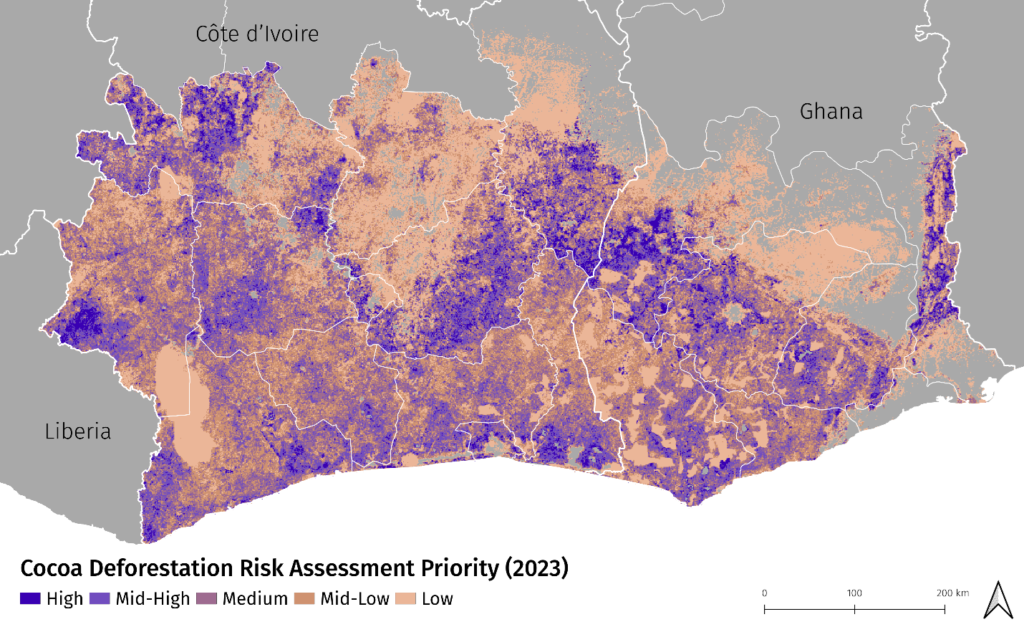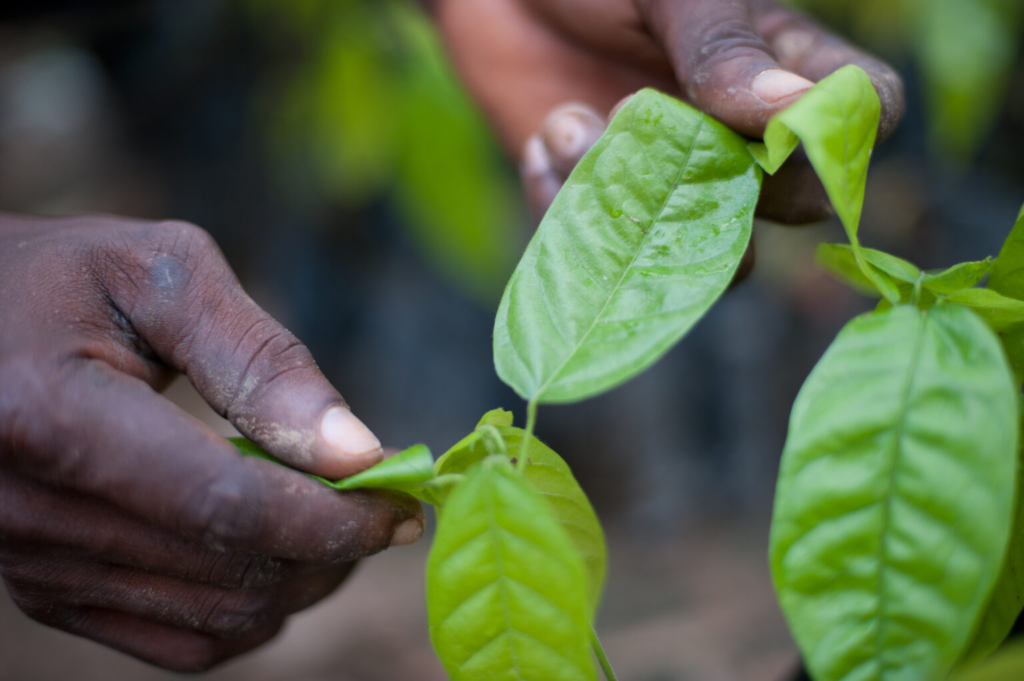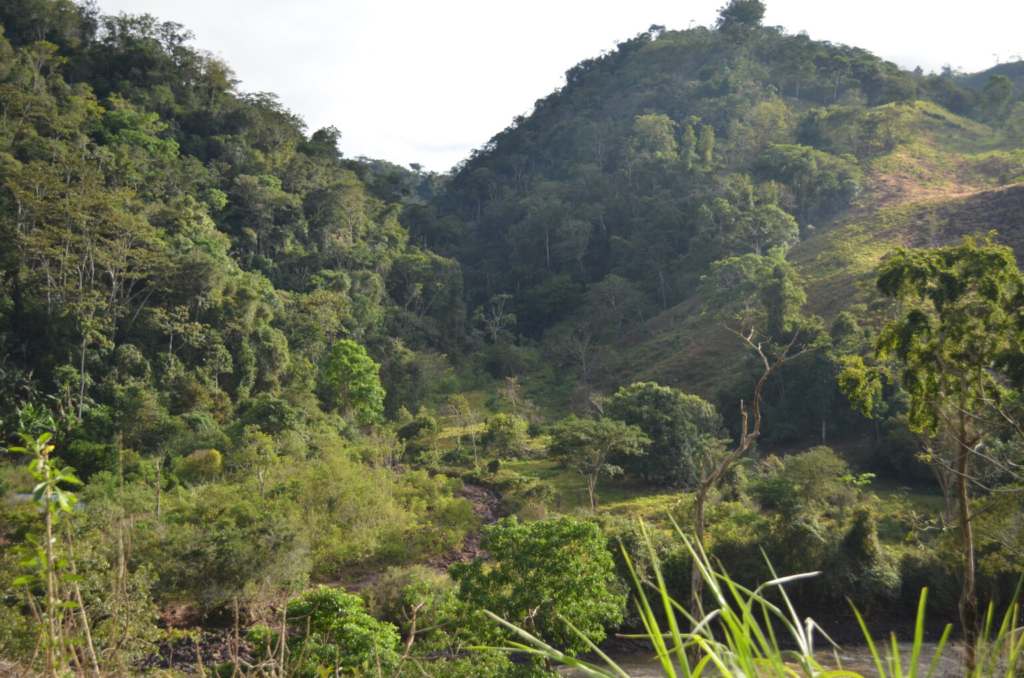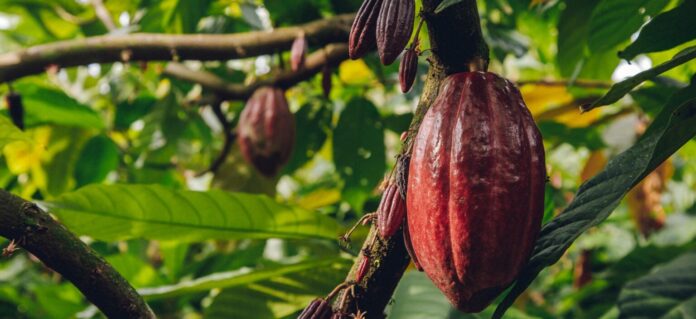Cocoa production has been linked to high rates of deforestation and biodiversity loss, making it a significant contributor to environmental degradation. Addressing and mitigating these negative impacts is essential for achieving a more sustainable cocoa supply chain.
ECOM, one of the world’s largest cocoa traders and processors that sources from over 30 countries, has made it a priority to reduce the negative impacts from their operations. One way they are doing so is by applying a standardized methodology developed by World Resources Institute (WRI) to ensure the cocoa beans they use are sustainably sourced and are not linked to forest loss.
Recognizing that collective action is critical to ending deforestation and no one company can tackle the problem alone, ECOM joined the Cocoa & Forests Initiative (CFI), facilitated by the World Cocoa Foundation (WCF) and the Sustainable Trade Initiative (IDH), and established in 2017 with the aim of ending cocoa-driven deforestation and restoring forest areas. Companies that joined the CFI agreed to map their supply chains, align methodologies on deforestation risk assessment and contribute to transparent monitoring and reporting.
To support these efforts, World Resources Institute (WRI) partnered with WCF and 19 major cocoa and chocolate companies to create two data-driven resources available on GFW — the West Africa Cocoa dataset and the Cocoa Deforestation Risk Assessment (DRA) — that ECOM has adapted and scaled to additional regions to secure a more sustainable cocoa supply chain.

Proactively identifying deforestation risk in cocoa supply chains
Prior to the Cocoa DRA, ECOM relied on broader, less tailored tools such as national level risk assessments or global data sets like the ones available on GFW. With the release of the Cocoa DRA, ECOM was able to adapt its methodology to carry out widespread risk assessment in a standardized manner, expanding the model to other geographies and analyzing data from Cameroon, Colombia, Côte d’Ivoire, Ecuador, Ghana, Nigeria, Peru, Mexico, Nicaragua, Sierra Leone, Vietnam and Uganda.
The flexibility of the Cocoa DRA has enabled ECOM to leverage global data and peer-reviewed methods while supplementing these with their own farm boundary data and ground verification (which is an essential component of cocoa monitoring since satellites can have trouble detecting cocoa grown under shade canopies).

Once high-risk areas have been identified, ECOM works with smallholder farmers to proactively tackle cocoa-linked deforestation, focusing on prevention through strategies like sensitization training or Payment for Ecosystem Services (PES) programs. The focus on high-risk locations enables further engagement with farmers and remediation to avoid excluding them from the supply chain, which can lead to worse outcomes and accelerate deforestation.
For example, since 2021, ECOM has partnered with a customer and local farming communities in Ghana to promote agroforestry through a PES initiative. The program provides farmers with multi-purpose shade trees, and farmers receive financial incentives for maintaining these trees over three years, boosting adoption rates. To ensure the program’s success and its meaningful contributions to local biodiversity and ecosystem health, ECOM conducted comprehensive land assessments prior to implementation. These assessments identified suitable tree species and accounted for farmers’ needs. The initiative includes training in Good Agricultural Practices, environmental stewardship and business management. A progress report due later in 2025 will highlight its impact on biodiversity and ecosystem health.

Beyond regulatory compliance
As the cocoa sector is focused on preparing for compliance with regulations like the European Union Deforestation Regulation (EUDR), it is crucial to recognize the continued importance of solutions and approaches that go beyond near-term compliance needs to effectively address sector-wide, systemic challenges.
While regulatory compliance assessments are focused on whether deforestation risk occurred after a given cut-off date, they often do not help identify future deforestation risk or inform collective action. The Cocoa DRA is intended to support better allocation of resources for halting deforestation and to enable collaborative approaches among cocoa supply chain actors where they’re most urgently needed to address deforestation.
For example, in Côte d’Ivoire, ECOM is using information gained from the Cocoa DRA to inform multiple efforts aiming to protect forests and support sustainability. In one project, they’re collaborating with the Green Innovation Centre of GIZ, the German Corporation for International Cooperation, to provide training and awareness-raising to help farmers adapt to climate change, build resilience and increase incomes through climate-smart cocoa and agroforestry. Around the protected areas of the Bossematié Nature Reserve and the Beki Classified Forest, ECOM is working to tackle deforestation and improve conservation by helping farmers in the forest buffer zone transition to agroforestry. They collaborated with GIZ to develop a management plan for the Reserve’s buffer zone and are now developing an incentive scheme based on carbon stocks and additional planting of trees for promoting agroforestry practices.

Additionally, two briquette production units are being installed within two of ECOM’s partner cooperatives to promote the use of sustainable briquettes made from organic waste. This initiative aims to reduce reliance on firewood to help prevent deforestation.
Finally, ECOM is also supporting local nurseries to develop plants for on- and off-farm planting and distributing trees to further accelerate the transition to agroforestry. This will all be supported by a local plan to monitor and prevent deforestation.

Using the Cocoa DRA and complementary data and tools, ECOM will continue ongoing monitoring efforts aimed at identifying and preventing future deforestation. This is a great step in the right direction, but ultimately, companies like ECOM need more solutions that can encourage collaborative approaches and continued innovation that prioritizes the needs of cocoa farmers and their communities. Only then can we truly achieve deforestation-free supply chains.
source: global forest watch



